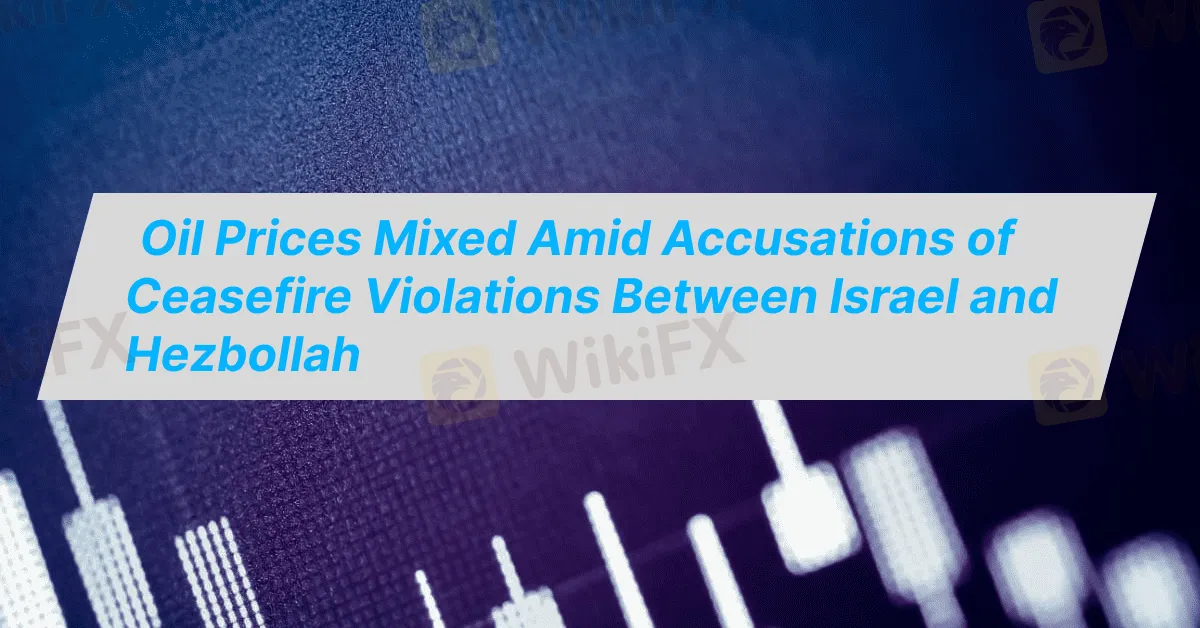Oil Prices Mixed Amid Accusations of Ceasefire Violations Between Israel and Hezbollah
Abstract:According to the report, Oil prices were mixed on Friday, with concerns over potential supply risks resurfacing following accusations from both Israel and Hezbollah regarding violations of their ceasefire. Investors are also awaiting a decision on OPEC+ output policy, as a delay to the group’s meeting adds uncertainty to the market.

According to the report, Oil prices were mixed on Friday, with concerns over potential supply risks resurfacing following accusations from both Israel and Hezbollah regarding violations of their ceasefire. Investors are also awaiting a decision on OPEC+ output policy, as a delay to the groups meeting adds uncertainty to the market.
By 02:32 GMT, Brent crude futures had dropped 7 cents, or 0.1%, to $73.21 per barrel. In contrast, U.S. West Texas Intermediate (WTI) crude futures rose by 38 cents, or 0.55%, to $69.10 compared to Wednesdays close.
Market trading was subdued due to the Thanksgiving holiday on Thursday, which resulted in the closure of U.S. financial markets.
On Thursday, Israel and Hezbollah exchanged accusations over alleged violations of their ceasefire, which had come into effect the day before. Initially, the ceasefire had appeared to alleviate fears of broader conflict and potential disruptions to oil supplies in the region. Despite these tensions, oil flows from the Middle East have remained largely unaffected by the ongoing conflicts between Israel and Hezbollah in Lebanon, as well as Hamas in Gaza.
Meanwhile, Russia launched a second attack this month on Ukrainian energy facilities, raising concerns over the risk of retaliatory actions that could impact Russian oil supplies. ANZ analysts noted that the escalating situation could disrupt oil production in the region.
Adding to the uncertainty, OPEC+—the coalition of OPEC members and their allies, including Russia—delayed its upcoming policy meeting to December 5th from the previously scheduled December 1st to avoid a conflict with another major event. Market expectations are that OPEC+ will extend its production cuts during the meeting.
In Iran, the country informed the United Nations nuclear watchdog of plans to install more than 6,000 additional uranium-enriching centrifuges at its nuclear facilities. Goldman Sachs analysts warned that if Western powers ramp up sanctions enforcement on Iranian oil exports, the country could see a reduction in crude oil production by up to 1 million barrels per day in the first half of next year.

Read more

WikiFX Community Ramadan Charity Creator Program
Share Trading Wisdom, Spread Ramadan Kindness

Shocking Drop: Gold Crashes in a Stunning Freefall!
Recently, the gold market has experienced significant volatility, with spot gold prices falling sharply.

Unbelievable! Trump to 'Sell US Green Cards'?
Trump has launched a shocking new immigration plan—the "Gold Card," priced at a staggering $5 million. What exactly is this all about? Let's take a closer look.

Shock! $800 Billion Vanishes from the Crypto Market
Once seen as a symbol of infinite potential and soaring profits, the cryptocurrency market has now experienced a shocking collapse, with approximately $800 billion in market value evaporating in a short period. Investors and traders are stunned by this sudden plunge, casting unprecedented doubts on the stability of the crypto market.
WikiFX Broker
Latest News
TriumphFX: The Persistent Forex Scam Draining Millions from Malaysians
Lawmakers Push New Crypto ATM Rules to Fight Fraud
2025 WikiFX Forex Rights Protection Day Preview
PH Senator Probes Love Scams Tied to POGOs
Mastering Calm: How to Stay Cool in Forex Trading?
The End of Costly USDT Transfers: Tron Reshapes Stablecoin Transactions
BP\s shareholders want it to make money, not climate policy
2025 SkyLine Guide Thailand Opening Ceremony: Jointly Witnessing New Skyline in a New Chapter
Why does Botbro change the domain name?
Safety Alert: FCA Discloses These 11 Unlicensed Financial Websites
Rate Calc

